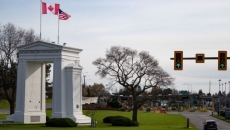A British Columbia political scientist says social media questioning of the provincial election's integrity is an "inevitable" result of political "toxicity" and a tight race.
University of British Columbia professor emeritus Richard Johnston says questions about mail-in votes and the handling of ballots also reflect circumstances south of the border.
He said other factors include use of more complicated voting apparatus and social media platforms where anyone can publish doubts.
"There is a relationship between the closeness of results and the toxicity of the commentary around it," Johnston said.
"I mean, we're describing almost exactly the situation in the U.S., right? Basically a 50/50 result, so close that each side might have suspicions about the other."
The British Columbia election came down to absentee ballots on Monday, after neither Premier David Eby's NDP nor the B.C. Conservatives, led by John Rustad, secured a majority.
After a count of mail-in votes over the weekend saw prospects for an NDP victory increase, online posts questioned the number of mail-in and absentee votes, the ballots' origins, the wait between the initial and final counts, and how the votes were handled during that time.
B.C. Conservatives president Aisha Estey said in a post on social media platform X on Sunday that she "spent the last two days in a warehouse watching the transcription and counting of mail-in ballots," and saw nothing problematic.
"Elections BC staff have been working tirelessly and doing their best within the confines of the legislation that governs their work," Estey said in her post.
"Would we have liked mail-ins to be counted closer to E-Day? Sure. But I saw nothing that caused me concern."
Premier and B.C. New Democrat Leader David Eby also took to X on Sunday to express support for Elections BC staff "making sure every vote gets counted."
Elections BC did not respond directly to questions about the integrity of the process, only saying that the final vote count was continuing on Monday.
Johnston said Elections BC's efforts to make voting more accessible and counting more efficient had actually been feeding integrity doubts.
He said increased use of advance voting, mail-in and absentee ballots, as well as digital vote tabulation, were being compared unfavourably by some with more basic voting and hand-counting systems used in the past.
"Basically, the whole voting process was simpler," Johnston said. "You had to turn up on election day. You had to have a reason for voting in advance polls … and you really had to basically make a declaration that you were going to have either a surgical procedure or you could not avoid being out of the constituency on election day.
"The count may take a long time on election day if it's a particularly close riding," he said. "But … there's a sense in which all the players who were on the ballot were in a position that was easily interpretable as verifying the facts. Everybody had an interest in defending its side, and the result would be in a sense accurate and fair."
Dominion Voting Systems, which manufactured the electronic tabulators used in the B.C. election, referred questions to its website page dedicated to misinformation about the company and its technology. It addresses concerns about misinformation that emerged after the U.S. presidential election in 2020.
Fox News agreed last year to pay Dominion nearly US$800 million to avert a trial in the company’s lawsuit that would have exposed how the network promoted lies about the election.
"All Dominion systems are based on voter-verifiable paper ballots or paper records for auditing," the company said on its web page. "Dominion systems comply with all requirements for system updates and election records retention."
Johnston also said the very idea of making voting more accessible could create a "background for paranoia," as doubters questioned the nature and origins of people who would not otherwise have been able to vote.
"Historically, paranoia about the conduct of elections has hardly been peculiar to the right wing of the political landscape," he said. "It's also been a feature on the left. It kind of depends on who wins and who loses.
"If you were to go back 20 years and look forward, I think a lot on the left would be shocked that it would be people on the left who are defending the integrity of the establishment, so to speak."
One major difference with discourse in the United States, Johnston said, was that B.C. party leaders, such as Estey, had so far not engaged in "delegitimization tactics."
Whether that changes would be something to watch for, he said.
"It'll be interesting to see whether there's blowback from the fringes of the Conservative Party against the party's own leadership," he said.
He added: "Let's see whether there are any dynamics inside the Conservative Party over the next few days that makes John Rustad worried that perhaps the party president's acceptance of the process was premature from a political point of view."






